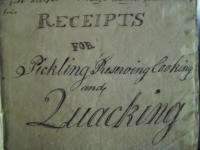Feeling a little under the weather lately? Stop eating ice cream cones! According to a 1920 letter by one Mary Stout Martin, they lead to sickness. This and many more healthy eating tips are preserved in the archives at Stenton.
Stenton was the home of James Logan (1674-1751), secretary to William Penn and later Mayor of Philadelphia, Chief Justice of the Pennsylvania Supreme Court, and acting Governor of Pennsylvania. Today, Stenton is one of the most important early 18th century buildings in Philadelphia. Since 1899, the site has been administered by the National Society of the Colonial Dames of America in the Commonwealth of Pennsylvania. While the vast majority of Logan Family Papers are at the Historical Society of Pennsylvania, Stenton does maintain a small quantity of manuscripts from James Logan and his descendants, as well as some other archival materials.
Among the larger collections in Stenton's archives is a series of letters from Mary Stout Martin to Mary Wister Logan. Spanning over four decades, from 1888 to 1932, the women wrote to each other regularly and frequently. They discussed issues large and small, including the sickness of a certain woman in their social circle (in an August 9th, 1920 letter). Martin identified the woman's poor eating habits as the probable cause of her ill health.

"Marty says she is feeling "like herself again" but admits that she has been seriously ill with some "floating bug" -- Edward told her -- that she picked up somewhere. I think she eats very reprehensible messes out of cans etc. and ice cream cones! It does seem incredible that a well brought up Colonial Dame should actually buy & eat ice cream cones; yet Marty actually does this & it would to my mind explain any illness or death."
Also included in Stenton's holdings is a cookbook from Sarah Elizabeth Logan (1812-1859) with "Receipts for Pickling, Preserving, Cooking and Quacking." Quacking in this context refers to the use of home remedies, from the old Dutch quacksalver (kwakzalver). Over time quacksalver was shortened to quack and came to connote a medical imposter, as "quack doctor" is an epithet in contemporary usage. When Sarah Elizabeth Logan used the term, though, she did not mean to imply any negative associations. Like many cookbooks from the time, her book contains recipes for home remedies as well as for food. To my taste, the recipes range from the delicious to the somewhat bizarre, but nothing seems so unpleasant as the medical concoctions.

"Potatoe pudding. Boil the potatoes very well, mash them fine with a ladle, put the butter to them & a little cream, eggs, rose water, spice, put it in a [paste], stick it with citron & bake it well."

"Influenza. In the winter 1815-16 when Nashville suffered severely Major Hall recommended a decoction made of the scaly bark hickory, a double handfull of the outside bark boiled in 3 quarts of water, & boiled down to a pint, & drank warm, causes a most violent perspiration for 24 or 30 hours, which relieves the patient & restores health!! The above antidote was used in many families & had the desired effect."
Unfortunately, Sarah Elizabeth Logan's cookbook contains no remedy for illness brought on by consumption of ice cream cones. But do not despair: the archives at Stenton hold at least one more food and remedy cookbook (likely 18th century and from the Norris-Dickinson line of the family) as well as a variety of other archival materials. The cure to the pesky ice cream headache may yet be somewhere in there!

